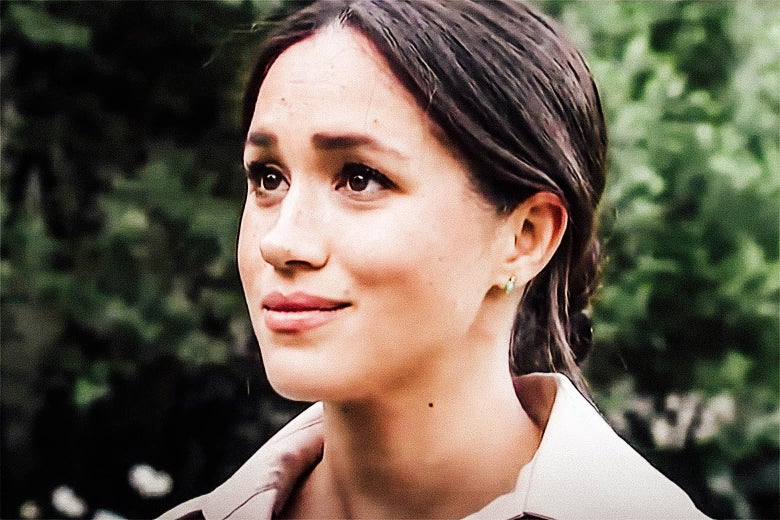
The former Meghan Markle in Harry & Meghan: An African Journey.
ITV
Last week, British television network ITV News tweeted out a clip of Meghan, the Duchess of Sussex that took the internet by storm. When journalist Tom Bradby inquired about Meghan’s physical and mental health postpartum in the midst of aggressive media scrutiny, she seemed to be on the verge of tears. “Thank you for asking because not many people have asked if I’m OK,” she said. The video was an excerpt from the ITV documentary Harry & Meghan: An African Journey, which debuted Sunday night in the U.K. and airs Wednesday night on ABC. It felt like a stark contrast to most royal interviews, with their canned messaging and polished, upbeat vibe. And scrolling through the tweets hashtagged #WeLoveYouMeghan after the clip was first released, it was hard not to notice the overwhelming amount of support that came from black people: Saeed Jones, Ayanna Pressley, Jamil Smith, and Roxane Gay, to name a few. But that support was nowhere near universal. One woman wrote: “#MeghanMarkle is trending yall. Why should I give two f***s about this? Sis knew she was marrying a head colonizer from a whole colonizing country no? What did she expect?”
This is a familiar dissonance for black supporters of Meghan, myself included. Watching that interview, I felt a pang of sympathy for the strain Meghan is obviously under. Black women feel an immediate and obvious connection to each other, especially in stiflingly white settings. We instinctively understand the pain of having to constantly translate yourself for the comfort of others, and we feel defensive when others dismiss sympathy for that pain as overwrought or undeserved. And how many children, subject to the Disney machine, grow up dreaming of being a princess? That this princess was born to a black mother descended from slaves made her belong to us in a way that seemed almost impossible.
Get Slate Culture in Your Inbox
The best of movies, TV, books, music, and more, delivered three times a week.
So it’s easy to empathize with Meghan—who has been subjected to years of obsessive, often racist coverage from the British tabloids—when you know that there is no position, no matter how rarefied, that can really buy you out of being black. On the other hand, it’s also true that there is very little of black life the world over that has not been touched by the cruelty of the British Empire. The reluctant black royalist is plagued by an inherent tension: How can you feel affection for individual monarchs while hating the monarchy as an institution? It’s the same tension I’d imagine nagged at an entire generation of black women who loved Princess Diana like one of their own. And it’s a tension that is encapsulated by Harry & Meghan: An African Journey.
Voice-over explains that Harry loves to visit Africa because “to be here is to be so far away from the stresses and pressures of the Western world.”
The draw of the documentary is clearly the intimate interviews with Harry and Meghan that Bradby—who happens to be a close enough friend that he was invited to the couple’s wedding—landed. But those interviews occupy maybe a quarter of the documentary’s running time.
The rest of it is devoted to a 10-day tour of Africa that the couple took with their son, Archie, in September. On the tail end of that tour, the couple announced that they were suing newspapers like the Mail on Sunday for “false” and “deliberately derogative” coverage. It is in the aftermath of this announcement that Bradby spoke to Meghan about how hard the tabloids were making her life.
Their trip begins in Cape Town, South Africa, where Bradby’s stirring narration on the legacy of apartheid conveniently leaves out any mention of British colonialism. That silence is maintained throughout the documentary, which sees Harry visit various charities in Angola, Malawi, and Botswana. Africa is largely just a backdrop for the plot of Meghan and Harry’s personal journeys. It’s in Angola that Harry reveals to Bradby the effect his mother’s death still has on him, an effect that has only been strengthened in the wake of what his wife has faced. “Every time I see a click, every time I see a flash, I’m taken straight back,” he said. In between moments like this are bits of voice-over from Bradby that suggest Harry loves to visit Africa not just because of his mother’s legacy of aid there but because “to be here is to be so far away from the stresses and pressures of the Western world.”
The royals’ inability to grapple with their own troubling legacy is only made clearer by Meghan’s presence. In a speech in Cape Town, she claims her place in the royal family to a group of women who are being taught to fight to combat rampant sexual violence—“while I’m here with my husband, as a member of the royal family.” In the same breath, she says, “I am with you as a mother, as a wife, as a woman, as a woman of color, and as your sister.” It is a moment of sheer improbability, one that admittedly made me wonder: Can a distantly shared lineage really bridge that vast gap between these women’s experiences? It’s clear that is what the documentary wants us to believe. Meghan is supposed to be that bridge. Instead, the uncanniness of that moment only heightens the tension that defines Meghan’s position: a black woman at the height of British society who still cannot escape the cruelties that bind her to the rest of us.
from Slate Magazine https://ift.tt/2N8TUfb
via IFTTT
沒有留言:
張貼留言